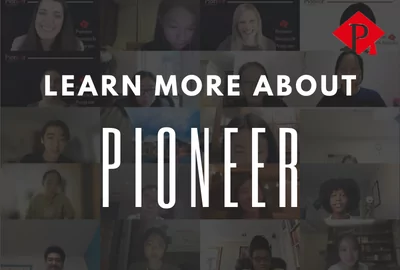Pioneer academics provides high school students from anywhere in the world with a unique opportunity to do university-level research online. Pioneer scholars conduct research on a broad range of topics, including the life sciences. This is made possible through Pioneer’s rigorous academic system, which emphasizes the originality of each student’s research topic while supporting their success. Students attain foundational knowledge in the first five sessions with their faculty mentor in small cohort groups. During this time, they dive into their research concentration through group discussions and readings, which include other research papers. With the necessary background knowledge and an idea of the research that is already out there, Pioneer scholars can develop an original research question based on their own interests and gaps in current knowledge. While conducting research remotely presents special challenges in the life sciences, Pioneer has developed methods that meet the academic rigor that enables scholars to work creatively within the limits of the online medium. There are methods that allow scholars to gather new data through surveys or use computer software to simulate experiments; there are ways to work with existing data to draw new conclusions; and some methods that focus on design experiments. In all cases, Pioneer scholars have the satisfaction of contributing new knowledge to their research area.
Conducting an experiment to create new data
Some Pioneer scholars manage to conduct experiments in the life sciences while doing online research. Ipek (neuroscience, 2020), a Pioneer scholar from Turkey, got her data by designing an online survey and sending it out to a diverse set of subjects. “Using an online survey meant I could send it to people all around the world, and I wasn’t restricted to people in my own country or friendship group,” she explains. Once she obtained the survey responses she needed, Ipek did a statistical analysis of the data, finding correlations and normal distributions.
Computer simulations also provide a way to perform experiments in an online research program. Catherine (neuroscience, 2020), a Pioneer scholar from the United States, studied applications for machine learning in seizure prediction. She designed an experiment and used the computer program Matlab to perform it. Her inspiration for this approach came from reviewing academic papers by other scholars on the topic. “My biggest advice [for developing a methodology] is to go through past papers, because there is so much you can learn,” she says.
Gathering data from existing research and drawing new conclusions
It is not always necessary to conduct an experiment in order to create new knowledge. Many Pioneer scholars in the life sciences write original research papers by analyzing data from existing scholarly papers found in the Oberlin Online Library. Students have access to this database because of Pioneer’s partnership with Oberlin College.
Some Pioneer scholars rely on a qualitative analysis of existing papers as the basis for their research. May (environmental studies, 2020), a Pioneer scholar from Korea, studied the feedback loop between marine plastic pollution and the fishing industry. Because she couldn’t gather her own firsthand data on this topic, she studied existing papers and synthesized the information she found to address her research questions. “I referred to the Oberlin Online Library and collected many different research papers, and extracted information from each of the papers,” she says. Crystal (biology, 2020), a Pioneer scholar from China, synthesized information from existing research papers for her research paper on the effectiveness of strength training. “The creative, new thing I contributed was summarizing information from many different papers into something brief… I also contrasted two types of strength training in two different papers, which was another creative part,” she says.
Other Pioneer scholars use existing data as raw material for statistical analysis. Joshua (chemistry, 2020), a Pioneer scholar from Nigeria, studied the effects of lead on childhood brain development. “I made sure I had data from multiple sources. Then from the data I did my calculations,” he says. Isa (chemistry, 2020), a Pioneer scholar from the United States, used a similar approach to study how pollution in the Potomac River would affect fish, which in turn affects osprey populations. Isa poured through research papers online to gather raw data and used toxic equivalency factor to calculate how pollution in fish accumulates in osprey.
Proposing a hypothetical experiment
Some Pioneer scholars decide to propose experiments in the knowledge that they will not be able to carry them out during the research program. Eleanor (neuroscience, 2020), a Pioneer scholar from China, did just that when she designed an experiment to compare arousal level and personality traits while subjects face tasks of varying complexities. Her proposed experiment required an fMRI machine to study the brains of her subjects, which she did not have access to during the Pioneer research program. Instead, she described her proposed methodology in depth and then discussed the possible results of the experiment. “At first I thought, if I can’t actually run this experiment, how can I make conclusions? Then I saw that I can talk about the possible results, and it forced me to be more reflective and make more predictions throughout the process. It made me more curious about my research topic,” Eleanor reflects.
Raaka (neuroscience, 2018), a Pioneer scholar from the United States, designed an experiment to evaluate the effectiveness of diagnostic tools for antisocial personality disorder in women. Because her review of existing literature on the subject revealed that women present fewer obvious symptoms of ASPD, Raaka’s hypothesis is that one-size-fits-all diagnostic testing will not work. Her proposed experiment compares male and female participants with ASPD and substance abuse disorders. Although she couldn’t conduct her experiment in actuality, she was able to graph and analyze the predicted data.
Pioneer Academics enables high school students to conduct high quality, original research in the life sciences. Whether carrying out an experiment, writing a proposal for future research, or analyzing existing data, Pioneer scholars make the most of the online medium and Pioneer’s many resources. For more examples of research by Pioneer scholars, consult the Pioneer Research Journal.


 Doing research is commonplace.
Doing research is commonplace.


